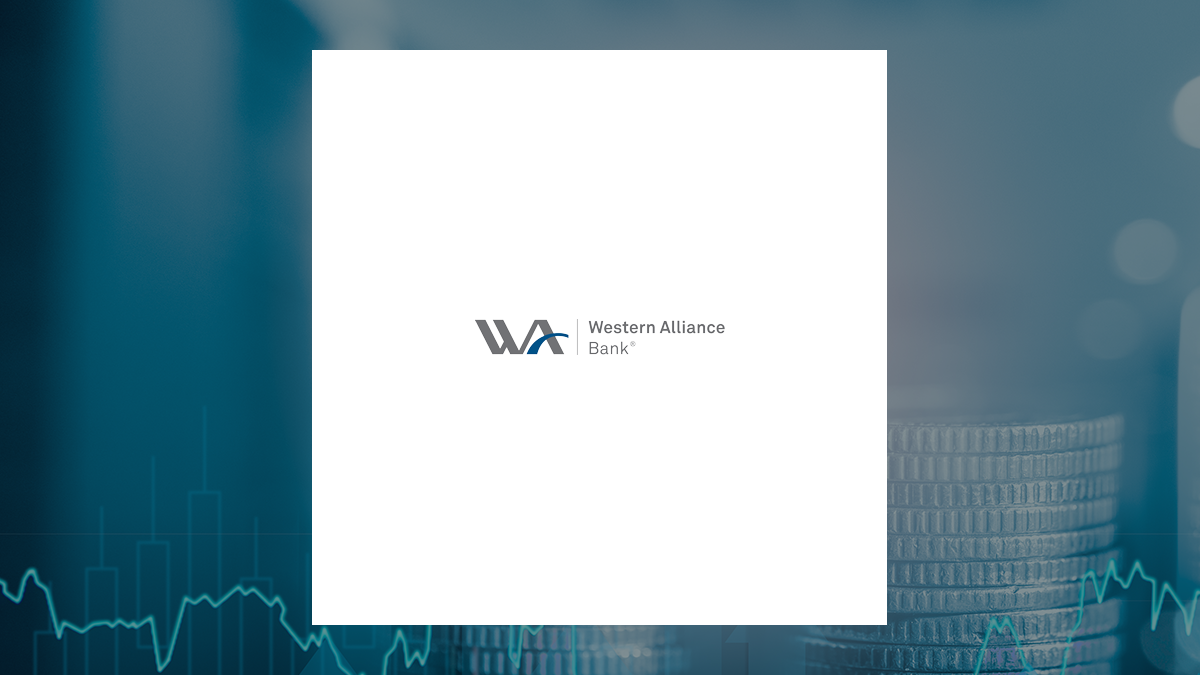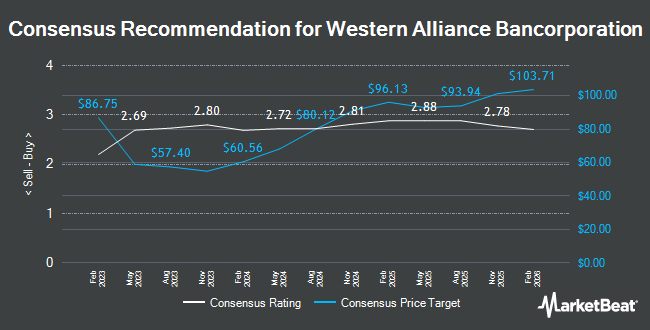
Truist Financial restated their buy rating on shares of Western Alliance Bancorporation (NYSE:WAL - Free Report) in a report issued on Monday, Benzinga reports. The firm currently has a $80.00 price target on the financial services provider's stock.
A number of other analysts also recently weighed in on the stock. Royal Bank of Canada increased their price target on shares of Western Alliance Bancorporation from $74.00 to $78.00 and gave the company an outperform rating in a report on Monday, January 29th. StockNews.com downgraded shares of Western Alliance Bancorporation from a hold rating to a sell rating in a report on Saturday, March 9th. Citigroup increased their price target on shares of Western Alliance Bancorporation from $76.00 to $82.00 and gave the company a buy rating in a report on Monday, January 29th. DA Davidson reissued a buy rating and issued a $85.00 price target on shares of Western Alliance Bancorporation in a report on Thursday, March 21st. Finally, Wells Fargo & Company reissued an equal weight rating and issued a $72.00 price target (up from $62.00) on shares of Western Alliance Bancorporation in a report on Tuesday, January 30th. One investment analyst has rated the stock with a sell rating, three have assigned a hold rating and twelve have given a buy rating to the company's stock. Based on data from MarketBeat, the company currently has a consensus rating of Moderate Buy and a consensus price target of $63.59.
View Our Latest Stock Analysis on WAL
Western Alliance Bancorporation Stock Down 2.7 %
Shares of WAL traded down $1.73 during mid-day trading on Monday, hitting $62.46. 988,944 shares of the company's stock were exchanged, compared to its average volume of 1,549,868. The firm has a fifty day moving average of $60.82 and a two-hundred day moving average of $55.35. Western Alliance Bancorporation has a twelve month low of $11.35 and a twelve month high of $70.23. The stock has a market cap of $6.88 billion, a price-to-earnings ratio of 9.55 and a beta of 1.47. The company has a quick ratio of 0.93, a current ratio of 0.96 and a debt-to-equity ratio of 1.40.
Western Alliance Bancorporation (NYSE:WAL - Get Free Report) last posted its quarterly earnings data on Friday, January 26th. The financial services provider reported $1.91 earnings per share (EPS) for the quarter, missing the consensus estimate of $1.93 by ($0.02). The firm had revenue of $1.13 billion for the quarter, compared to the consensus estimate of $705.97 million. Western Alliance Bancorporation had a return on equity of 16.33% and a net margin of 16.74%. During the same period in the prior year, the company posted $2.67 earnings per share. On average, sell-side analysts forecast that Western Alliance Bancorporation will post 7.9 earnings per share for the current year.
Western Alliance Bancorporation Announces Dividend
The company also recently announced a quarterly dividend, which was paid on Friday, March 1st. Investors of record on Friday, February 16th were given a dividend of $0.37 per share. This represents a $1.48 dividend on an annualized basis and a dividend yield of 2.37%. The ex-dividend date of this dividend was Thursday, February 15th. Western Alliance Bancorporation's dividend payout ratio (DPR) is currently 22.63%.
Institutional Investors Weigh In On Western Alliance Bancorporation
Hedge funds and other institutional investors have recently added to or reduced their stakes in the stock. State Street Corp boosted its stake in shares of Western Alliance Bancorporation by 44.4% in the 1st quarter. State Street Corp now owns 4,056,477 shares of the financial services provider's stock valued at $144,167,000 after purchasing an additional 1,246,855 shares during the last quarter. Smead Capital Management Inc. bought a new position in shares of Western Alliance Bancorporation in the 4th quarter valued at about $77,957,000. Norges Bank bought a new position in shares of Western Alliance Bancorporation in the 4th quarter valued at about $68,940,000. Barclays PLC boosted its stake in shares of Western Alliance Bancorporation by 489.0% in the 3rd quarter. Barclays PLC now owns 1,333,881 shares of the financial services provider's stock valued at $61,320,000 after purchasing an additional 1,107,431 shares during the last quarter. Finally, Alyeska Investment Group L.P. bought a new position in shares of Western Alliance Bancorporation in the 1st quarter valued at about $32,430,000. Institutional investors and hedge funds own 79.15% of the company's stock.
About Western Alliance Bancorporation
(
Get Free Report)
Western Alliance Bancorporation operates as the bank holding company for Western Alliance Bank that provides various banking products and related services primarily in Arizona, California, and Nevada. It operates through Commercial and Consumer Related segments. The company offers deposit products, including checking, savings, and money market accounts, as well as fixed-rate and fixed maturity certificates of deposit accounts; demand deposits; and treasury management and residential mortgage products and services.
Read More

Before you consider Western Alliance Bancorporation, you'll want to hear this.
MarketBeat keeps track of Wall Street's top-rated and best performing research analysts and the stocks they recommend to their clients on a daily basis. MarketBeat has identified the five stocks that top analysts are quietly whispering to their clients to buy now before the broader market catches on... and Western Alliance Bancorporation wasn't on the list.
While Western Alliance Bancorporation currently has a "Moderate Buy" rating among analysts, top-rated analysts believe these five stocks are better buys.
View The Five Stocks Here
Looking to avoid the hassle of mudslinging, volatility, and uncertainty? You'd need to be out of the market, which isn’t viable. So where should investors put their money? Find out with this report.
Get This Free Report